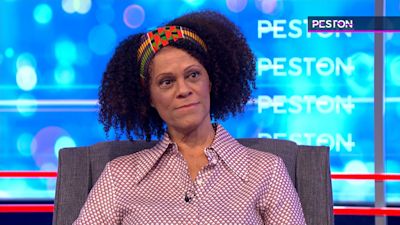‘It’s our duty to re-write history’: Bernardine Evaristo hits back at Johnson’s Churchill remarks

Watch the full interview with Bernardine Evaristo on ITV's Peston show
British award-winning writer Bernadine Evaristo has branded as "ridiculous" Prime Minister Boris Johnson's comments that calling Winston Churchill racist was "re-writing Britain’s national story".
During keynote speech on the final day of the Conservative Party Conference, the prime minister said: "As time has gone by, it has become clear to me that this isn't just a joke - they really do want to rewrite our national story - starting with Hereward the Woke.
"We, Conservatives, will defend our history and cultural inheritance," he added to rapturous applause from the audience.
On his ITV show, Political Editor Robert Peston asked Ms Evaristo for her thoughts on Mr Johnson's remarks saying he "seems to imply that if we talk about his (Churchill's) racism, I mean, there's a phrase he uses that we're 'betraying our children's education'".
Ms Evaristo replied: “I think it's our duty to rewrite history because the way in which history has been recorded has been from very particular perspectives, essentially white and male”.
Adding: “And I think we also need to understand that historical figures were complex and that people might have had good qualities and also bad qualities.
“But I think it's really, really, very simplistic and childish to think that we're not allowed to look back at history from the 21st century and explore the things that were difficult and negative about it in your working life”.
The author of Girl, Woman, Other on Thursday released her first non-fiction book, Manifesto: On Never Giving Up, sharing her inspirational life story and her journey to becoming the first black woman to win the prestigious Booker Prize.
The history-making author described how racism was a prominent part of her lived experience growing up in Woolwich, in south-east London, where her family’s windows were often smashed in by local thugs.
But her long journey breaking down barriers led her to become a trailblazing writer, teacher and activist, rebelling against mainstream literature.
Ms Evaristo spoke to Robert Peston about the racism that had been rife in Britain when her father immigrated to the country.
“My father came from Nigeria in 1949, and he most definitely suffered the sort of the kind of racism that was evident then,” she said.
“And don't forget that the Race Relations Act didn't really come into full force until the mid-seventies, so people couldn't be prosecuted for their racist behaviour before then”, she added.
On breaking into the heavily white-dominated publishing world, Ms Evaristo said her childhood experience “was really about being an outsider, coming from this inter-racial family in a very white area, not seeing black literature around me”.
But she added that there has been a shift today and the industry is now “really seriously looking at itself” and trying to make sure it is more inclusive.
As the first black woman, and indeed the first black British author to receive the prestigious Booker prize in its 50-year history, the novel she’d won the award for in 2019, Girl, Woman, Other, is now on the A-level teaching syllabus.
“I love the idea that these 17, 18-year-olds are going to be engaging with my work”, she said.
Ms Evaristo’s works often discuss social issues including feminism and misogyny, and in light of the recent increased discussions around the safety of women, Ms Evaristo said that when she was a young woman in the 1980s “ when they were reporting instances of sexual violence against women, often the kind of news reporting would suggest that there was something wrong with the woman, that there was something about the way she was dressing and so on and so forth”.
She added that while this has now changed and improved from before, “there’s definitely something wrong with the way it's reported”, suggesting that not all crimes are covered equally.
“If you think about Sarah Everard and the way that her case struck the national consciousness, and then you think about the two sisters who were killed in the park in Clapham and how that was completely overlooked, so you know there are various issues here”, she explained.